英语中的句子种类
英语中句子的种类

三句子的种类句子是一个独立的语言单位,表示一个完整的思想.按使用目的可分为陈述句、感叹句、疑问句和祈使句;从结构上又可分为简单句、并列句和复合句.按使用目的分:一、陈述句That boy always helps others.Tom was not at home yesterday.He is too late to catch the bus.二、疑问句一般疑问句、特殊疑问句、选择疑问句和反意疑问句Are you a doctorHow often do you have an English partyWhich would you like better, tea or coffeeShe is too young to go to school, is she三、感叹句(一)What +a /an+形容词+可数名词的单数形式+主语+谓语 ==二How+形容词+a/an +可数名词的单数形式+主语+谓语What a beautiful girl she is == How beautiful a girl she is三 What+形容词+可数名词的复数+主语+谓语What beautiful girls they are(四)What+形容词+不可数名词+主语+谓语What fine weather it is(五)How+形容词或副词+主语+谓语How interesting the dog is(六)How+主语+谓语How time flies四、祈使句祈使句主语通常被省略,谓语动词用原型.Be quietDon’t be late从结构上分:一、简单句句子只包含一个主谓结构.如,五种基本句型列式如下:基本句型一:主+系+表基本句型二:主+谓基本句型三:主+谓+宾基本句型四:主+谓+间宾+直宾基本句型五主+谓+宾+宾补.二、并列句句子包含两个或多个主谓结构,通常有并列连词连结.由并列连词把两个或两个以上的简单句连在一起的句子叫并列句.不同的并列连词表示并列分句之间的不同关系.根据并列分句之间的关系不同,并列句可以分为以下几种: 1.表示联合关系的并列句这类并列句常用并列连词and 和,not only ... but also... 不但……而且……等来连接,这时分句之间是顺承关系或并列关系.and一般不译出来.1. We bought her a birthday present,_____ she liked it very much.A. soB. orC. andD. but2. — Didn’t you give roses to your father on Father’s Day— Oh, not only my father,_____ my grandpa got red roses.A. orB. andC. butD. until2.表示转折关系的并列句这类并列句常用but 但是;可是,yet可是;然而,while 而等来连接,后面分句与前面分句之间有意义上的转折关系.1. — Would you like to go to the concert with me— I’d love to,_____ I can’t. I have a lot of homework to do.A. orB. butC. soD. and2. The doctors tried their best to save the patient’s life,_____ failedA. orB. soC. butD. because3.表示选择关系的并列句这类并列句常用并列连词or或者,either …or …要么……,要么……等连接.1. _____ Lily _____ Lucy may go with you because one of them must stay at home.A. Not only; but alsoB. Neither; norC. Both; andD. Either; or2. None of the shoes in the shops are the right size. They are _____ too big _____ too small.A. both; andB. neither; norC. either; orD. not only; but also3. “Are you going to eat here ____ take it away” asked the waiter..A. andB. soC. orD. but.4.表示因果关系的并列句这类并列句常用并列连词so因此;所以,for 因为等连接,后面分句与前面分句之间有因果关系.1. Mother was ill,_____ Father cooked for us instead.A. butB. orC. soD. and2. There is a lot of traffic in this city,_____ look both waysbefore crossing the streetA. soB. andC. butD. for特殊的并列句1.祈使句+and+一般将来时的句子这个句型表示“如果做到了祈使句表示的事情,就会有后面句子表示的结果”.2.例如: Study hard,_____ you are sure to have a good resultin the exam.A. orB. andC. forD. but3. 2. 祈使句 + or + 一般将来时的句子这个句型表示“如果做不到祈使句表示的事情,就会有后面句子表示的结果”4.例如: 1. Be quick,_____ we’ll be late for class.A. orB. soC. andD. but2. Come a little earlier next time,_____ you’ll miss thebest part of the TV play.A. andB. butC. orD. till三、复合句复合句Complex Sentence由一个主句Principal Clause和一个或一个以上的从句Subordinate Clause构成. 主句是全句的主体,通常可以独立存在;从句则是一个句子成分,不能独立存在.从句不能单独成句,但它也有主语部分和谓语部分,就像一个句子一样.所不同在于,从句须由一个关联词引导. 我们至今学过的从句有:定语从句, 名词性从句主语从句、宾语从句、表语从句、同位语从句,和状语从句.1. 定语从句 He is the man who wants to see you.2. 同位语从句 She told us her hope that she would become a pianist.注意:定语和同位语从句的区别.3. 表语从句 This is what we should do4. 宾语从句注意it做形式宾语Everybody knows that money doesn't grow on treesWe think it wrong that he told a lie to everyone. it做形式宾语5.主语从句注意it做形式主语What caused the accident remains unknownIt is certain that he will win the matchit做形式主语6.状语从句MyfriendsdislikemebecauseI’mhandsomeandsuccessfu l.。
英语句子种类

---Haven’t you been to the UK? ---No, I haven’t.
2)特殊疑问句 疑问词有 who,whose,what,which,where,when, why,how等。 (1)陈述语序 Who was the first man in space? (2)倒装语序 Who are you talking about?
4)反义疑问句 does 1.Tom hardly knows French, ______ ______? he 2. — Mary didn't fail her exam, did she? —— ______, she didn’t. No 3.You needn’t come, ______ you? must You need to come, ______ you? don’t 4.He had a big time there, ______ he? didn’t He had a car, ______ he? hadn’t We hardly have to get up early, ____ we? do didn’t 5.He used to live in Leeds, ______ he?
注:A、简略式 Why not go alone? Why get so angry? How/What about taking a rest? B、复杂特殊疑问句 What do you think he has done?
3)选择疑问句 (1)以一般疑问句为基础 Is he a teacher or a doctor or a policeman? Shall I help you or can you manage? (2)以特殊疑问句为基础 Which do you prefer, red wine or white? How shall we go there? By bus or by train?
英语句子的种类

英语句子的种类英语句子按使用目的可分为陈述句、祈使句、感叹句和疑问句四种。
陈述句是说明一个事实或陈述一种看法的句子。
例如:Light travels faster tha n sou nd. 光比声速度快。
The film isn ' t rather bori这部电影不是很乏味。
The People ' s Republic of China was founded in 1949华人名共和国成立于1949 年。
There used to be a temple here.这儿原来有座庙。
She is working for a foreign company. 她正在为一家外国公司工作。
They have all read the book.他们都已读过了这本书。
二、祈使句祈使句用以表达命令,要求,请求,劝告或建议等。
常用下列几种句型。
例如:1、以动词原形开头的祈使句。
这些句子的主语通常都是第二人称“you”Take this seat.坐这个位子。
Do be careful.千万要小心!Don't move, please.请另U动。
Don't be nervous! 别紧张!2、以let开头的祈使句。
Let's包括说话者,Let us不包括说话者。
例如:Let's have another try.咱们再试一下。
Let us have another try.请(你)让我们再试一下。
Let's not talk of that matter.咱们不谈那件事。
Let us not talk of that matter.请让我们不谈那件事。
3、带主语的祈使句。
谓语动词任然用原型。
例如:God bless me.上帝保佑我!You feed the chicks today, Tom.汤姆,今天你喂鸡。
(吩咐任务。
)三、感叹句感叹句是表示说话人赞美、惊叹、喜悦、愤怒等感情的句子。
句子的种类

How clever a boy he is! How lovely the baby is! What noise they are making! What a clever boy he is! What wonderful ideas (we have)! What cold weather it is! 感叹句的省略形式为: What a clever boy (he is)!
c. 选择疑问句(Alternative Questions): Do you want tea or coffee ? 你是要茶还是要咖啡 d. 反意疑问句(Tag-Questions): He doesn't know her, does he ? 他不认识她,对不对
3) 祈使句(Imperative Sentences):用以 表达命令,要求,请求,劝告等。祈使句 有两种类型 a. 以动词原形开头,在动词原形之前加do (但只限于省略第二人称主语的句子)。 Take this seat. Do be careful. 否定结构: Don't move. Don't be late.
The food was good, but he had little appetite. (主) (谓) (主)(谓) 食物很精美,但他却没什么胃口。 3) 复合句(Complex Sentences):包含一个 主句从句和一个或几个从句的句子叫复合句, 从句由从属连词引导,例如: The film had begun when we got to the cinema. 主句 从句 我们到达电影院的时候,电影已经开演了。
英语句子种类

句子可分为三种:
1.Simple sentence 简单句 (单一主语+单一谓语+其他成分) eg: Margie hated school.
2. Compound sentence 并列句 (and, but, or 等并列连词连接的两 个各有主谓的简单句) eg: Jerry likes reading and she has read lots of books.
3
I can’t swim. Li Ping is sitting under the tree. 我不会游泳。 李平正坐在树下。 The children are playing on the playground. 孩子们在操场上玩。 The plane disappeared in the sky. Great 飞机消失在天空中。 place in our changes have taken 近几年,我国发生了很大的变化。 country recently. 马丽没回答。 Mary didn’t answer. 那儿发生了什么事? What happened there? 她一言不发就走了。 She left without saying a word.
常见的系动词有 be,become,get,grow,look,turn,feel, taste,smell,seem,remain,sound,ke ep,fall,appear,go,etc. 2. S + Vt + O 主语+及物动词+宾语
3. S + Vi 主语+不及物动词 4. S + Vt + D.O 主语+及物动词+双宾语 give, show, tell, lend, write, pass, hand, send, bring, return, sing, make, do, buy,etc. 双宾:1) 间接宾语(人)+直接宾语(物) 2)直接宾语+for/to+间接宾语
英语语法句子种类

句子复习句子是具有一定的语法结构,表达一个独立完整意义的语言单位按使用目的可分为陈述句、疑问句、祈使句和感叹句。
1)陈述句(Declarative Sentences):说明一个事实或陈述一种看法Light travels faster than sound.光比声速度快。
(说明事实)The film is rather boring.这部电影很乏味。
(说明看法)2)疑问句(Interrogative Sentences):提出问题。
有以下四种a.一般疑问句(General Questions):由be 动词,情态动词,或助动词引导的问句。
Can you finish the work in time? 你能按时完成工作吗?b. 特殊疑问句(W Questions; H Questions):由特俗疑问词引导的问句(what,where,which,when,how,why)Where do you live?你住那儿?How do you know that? 你怎么知道那件事?c.选择疑问句(Alternative Questions):由or引导的选择性问句Do you want tea or coffee? 你是要茶还是要咖啡?d.反意疑问句(Tag-Questions):He doesn't know her, does he? 他不认识她,对不对?3)祈使句(Imperative Sentences):提出请求,建议或发出命令,有2种基本结构:(1)直接以动词开始的简短性句子,其否定形式直接由助动词的否定形式表示。
Sit down, please.请坐。
Don't be nervous!别紧张!(2)由let's 或let us引导的句子a.Let's包括说话者Let's have another try,shall we/shan't we?b.Let us不包括说话者Let us have another try,will you /won't you? 4)感叹句(Exclamatory Sentences):表示说话人惊奇、喜悦、愤怒等情绪,感叹句往往由what和how引导。
英语句子的种类

英语句子的种类 (1)1.1句子的种类 ..................................................................1.2 1 1.2 陈述句 .........................................................................................1.31 1.3 疑问句 ......................................................1.41 1.4 祈使句 ..................................................................................................................1.5 3 1.5 感叹句 .........................................................................................................1.6 4 1.6 there be结构 .................................................................................................1.74 1.7 否定结构 (5)英语句子的种类1.1 句子的种类句子按其用途可分为陈述句、疑问句、祈使句和感叹句四种。
如:(1)The English have a wonderful sense of humor.英国人有一种奇妙的幽默感。
(陈述句)(2)Who is your favorite author?谁是你喜爱的作家?(疑问句)(3)Don’t believe all the gossip you hear.别轻信听来的一切闲言碎语。
句子的种类英语基础语法汇总
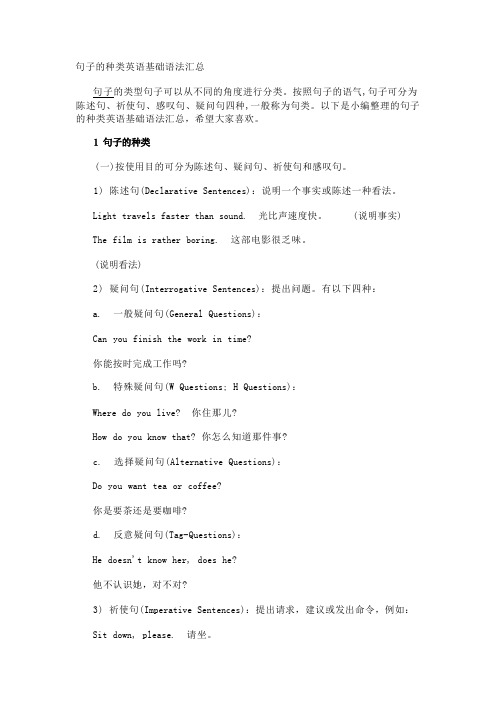
句子的种类英语基础语法汇总句子的类型句子可以从不同的角度进行分类。
按照句子的语气,句子可分为陈述句、祈使句、感叹句、疑问句四种,一般称为句类。
以下是小编整理的句子的种类英语基础语法汇总,希望大家喜欢。
(一)按使用目的可分为陈述句、疑问句、祈使句和感叹句。
1) 陈述句(Declarative Sentences):说明一个事实或陈述一种看法。
Light travels faster than sound. 光比声速度快。
(说明事实)The film is rather boring. 这部电影很乏味。
(说明看法)2) 疑问句(Interrogative Sentences):提出问题。
有以下四种:a. 一般疑问句(General Questions):Can you finish the work in time?你能按时完成工作吗?b. 特殊疑问句(W Questions; H Questions):Where do you live? 你住那儿?How do you know that? 你怎么知道那件事?c. 选择疑问句(Alternative Questions):Do you want tea or coffee?你是要茶还是要咖啡?d. 反意疑问句(Tag-Questions):He doesn't know her, does he?他不认识她,对不对?3) 祈使句(Imperative Sentences):提出请求,建议或发出命令,例如:Sit down, please. 请坐。
Don't be nervous! 别紧张!4) 感叹句(Exclamatory Sentences):表示说话人惊奇、喜悦、愤怒等情绪,例如:What good news it is! 多好的消息啊!(二)句子按其结构可以分为以下三类:1) 简单句(Simple Sentences):只包含一个主谓结构句子叫简单句,例如:She is fond of collecting stamps. 她喜欢集邮。
英语句子种类与类型

2、疑问句 (Interrogative sentence)
I
有一般疑问句、特殊疑问句、选择疑问句、
反义疑问句。
、 句
1)一般疑问句 (General Questions)
子 种
以情态动词,助动词或系动词Be开头的疑问句。 类
用来询问一件事,答案通常是yes或 no,注意语序。
句 子
7、目的(so that,in order that,in case) ;
类 型
8、条件(if,unless) ;
9、让步(though,although,even if,even though,in spite of the fact that ,whenever,wherever,whoever,whichever,
However,no matter how,whether) 。
3、复合句
并列复合句 即并列连词连接了带
从句的并列句。
二
、
English is widely used in the world, but China 句
has the largest number of people who speak 子
The man dressed in black seems to be a spy.
2、并列句 包含两个或更多互不依从的主谓
结构,分句由并列连词and,then,but,or,or
else,so,for,while,when;both…and,either
…or,neither…nor,not only…,but also,as
用来表达命令、要求、请求、劝告等。说话的对象 是第二人称时,you经常被省略。句末用句号或者叹号。
英语句子的种类
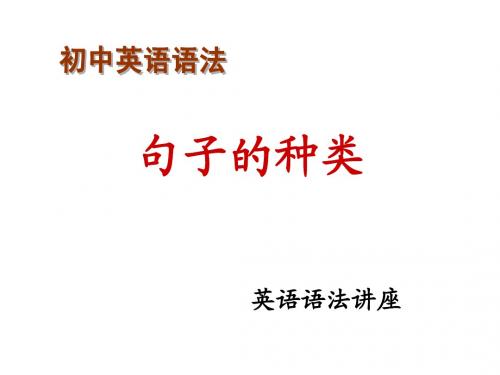
四)感叹句的转换 what与how引导的感叹句,一般情况 下可以相互转换,转换后意义不变。如: What an interesting story it is ! = How interesting the story is !
What a beautiful building it is ! = How beautiful the building is !
简单句
• 1. Let us pass, ____? • A. shan’t we B. shall we C. won’t we D. will you • 2. I suppose he’s serious, ____ ? • A. do I B. don’t I C. is he D. isn’t he • 3. You had better not smoke here, ____? • A. will you B. had you • C. shall you D. have you • 4. Train as hard as you can ____ you’ll win the swimming competition. • A. then B. but C. and D. or
句子的种类
英语语法讲座
句子种类按说话的目的可分为四类:
1 、陈述句(肯定、否定)
He is six years old . She didn’t hear of you before .
2 、疑问句(一般、特殊、选择、反意)
Do they like skating ? How old is he ? Is he six or seven years old ? Mary can swim, can’t she ?
英语语法之句子的种类

英语语法之句子的种类一、分类:按使用目的可分为陈述句、疑问句、祈使句和感叹句。
1. 陈述句:说明一个事实或陈述一种看法。
He gets up at six. 他六点钟起床。
(说明事实)I don't think so .我不这么认为。
(说明看法)2.疑问句:提出问题。
①一般疑问句:Can you finish the work in time?你能按时完成工作吗?②特殊疑问句:Where do you live?你住那儿?How do you know that? 你怎么知道那件事?③选择疑问句:Do you want tea or coffee?你是要茶还是要咖啡?④反意疑问句:He doesn't know her, does he?他不认识她,对不对?3. 祈使句:提出请求,建议或发出命令Sit down, please.请坐。
Don't be nervous!别紧张!4. 感叹句:表示说话人惊奇、喜悦、愤怒等情绪.1.陈述句:①肯定式:This is my sister .I like reading books at weekends .②否定式:A: "be+not" I am not a student.B:"do\does\did +not" He does not like playing basketball.C:"助动词\情态动词+not" I can not swim.D:用no、nothing、nobody表否定.I know nothing about it.2. 一般疑问句:①定义:用be动词、助动词或情态动词置于句首,可用“yes”或“no”来回答的问句。
②应答:用yes\no(或相当于“yes”或“no”的词)回答,并根据句首的be动词、情态动词或助动词作相应的回答。
--Is Mary a Japanese girl ? --Yes,she is.\No,she isn't.--Can you speak English? --Yes,I can .\No, I can't .--Do you like your teacher ? --Yes,I do.\No, I don't .③变形:如何将一个肯定的陈述句变为一般疑问句:A:看句中有无be动词,如果有be动词提到句首即可。
英语句子种类

2、并列句
and, but, or so, for, while,
both…and, either…or,
neither…nor, not only…,but also, as well as
He is a basketball fan, and his wife is a volleyball fan. Honey is sweet, but the bee stings. Don’t be late, for there is a meeting. Hurry up, or you’ll be late. He works hard while his brother is a lazy bone. He was enjoying his KFC when a friend came.
英语句子种类与类型
英语句子种类与类型
I、句子种类(按交际用途分)
陈述句、疑问句、祈使句、感叹句、
There be存在句
II、句子类型(按句子结构分) 简单句、并列句、复合句、并列复合句
I、句子种类(按交际用途分)
陈述句、疑问句、祈使句、
感叹句、There be存在句
1、陈述句
She arrived early.
II、句子类型(按句子结构分)
简单句、并列句、复合句、 并列复合句
1、简单句
All roads lead to Rome. He got up, dressed quickly, washed himself and went out. Is he a superman?
句子的种类
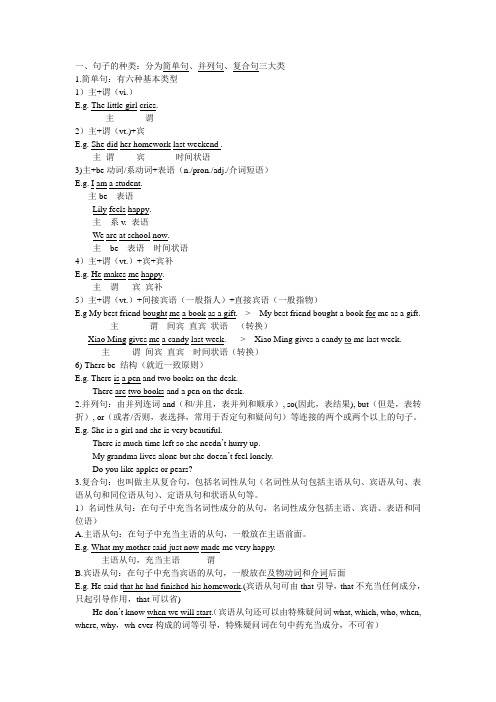
一、句子的种类:分为简单句、并列句、复合句三大类1.简单句:有六种基本类型1)主+谓(vi.)E.g. The little girl cries.主谓2)主+谓(vt.)+宾E.g. She did her homework last weekend .主谓宾时间状语3)主+be动词/系动词+表语(n./pron./adj./介词短语)E.g. I am a student.主be 表语Lily feels happy.主系v. 表语We are at school now.主be 表语时间状语4)主+谓(vt.)+宾+宾补E.g. He makes me happy.主谓宾宾补5)主+谓(vt.)+间接宾语(一般指人)+直接宾语(一般指物)E.g My best friend bought me a book as a gift. --> My best friend bought a book for me as a gift.主谓间宾直宾状语(转换)Xiao Ming gives me a candy last week. --> Xiao Ming gives a candy to me last week.主谓间宾直宾时间状语(转换)6)There be 结构(就近一致原则)E.g. There is a pen and two books on the desk.There are two books and a pen on the desk.2.并列句:由并列连词and(和/并且,表并列和顺承), so(因此,表结果), but(但是,表转折), or(或者/否则,表选择,常用于否定句和疑问句)等连接的两个或两个以上的句子。
E.g. She is a girl and she is very beautiful.There is much time left so she needn’t hurry up.My grandma lives alone but she doesn’t feel lonely.Do you like apples or pears?3.复合句:也叫做主从复合句,包括名词性从句(名词性从句包括主语从句、宾语从句、表语从句和同位语从句)、定语从句和状语从句等。
英语句子种类

6.句子的种类句子的分类。
根据语气可分为:陈述句、疑问句、祈使句和感叹句。
根据结构可分为:简单句、并列句和复合句。
※简单句是只包括一个主谓结构的句子。
※并列句是包含两个或两个以上主谓结构的句子,句子之间常用并列连词连接。
常见的连词有and, but, or, so等。
(一)按使用目的可分为陈述句、疑问句、祈使句和感叹句。
1)陈述句(Declarative Sentences):说明一个事实或陈述一种看法,包括肯定句和否定句。
Light travels faster than sound.(说明事实)The film is rather boring.(说明看法)I don’t enjoy your personality .2)疑问句:提出问题。
有以下四种:a.一般疑问句(General Questions):①:概念:不用疑问词,但需要用yes 或no 回答的疑问句,叫一般疑问句。
用升调。
句末用问号“?”。
以be 动词,助动词(do, does ,did , have, has ,had , will, shall, would )或情态动词(can ,could ,must ,may ,might . need , should, ought (to ) , dare )等开头+ 主语+ 主要动词+ 其它+ ?②、详解:一般疑问句的结构1. be动词的一般疑问句句型:Be动词+主语~?Is your father angry ?Yes ,he is.No ,he isn't.天空上有鸟吗?嗯,有。
/ 不,没有。
_____________________________________________________Is English spoken all over the world ?Yes ,it is. No ,it isn't.Were the babies crying last night ?Yes ,they were.No ,they weren't.昨晚婴儿在哭泣吗?嗯,是的。
英语句子种类与类型

She arrived early.
I
She cannot have arrived now.
、
注:1)半否定句
句
子
I hardly know anything about it.
种
2)部分否定句与全否定句
类
I don’t like both the films.
I like neither Cathy nor Mary.
(1)陈述语序
I
Who was the first man in space?
、
(2)倒装语序
句 子
Who are you talking about?
种
类
注:A、简略式
Why not go alone? Why get so angry?
How/What about taking a rest?
B、复杂特殊疑问句
、
He got up, dressed quickly, washed himself and went out.
句 子 类
Is he a superman?
型
Don’t be shy. Have a try.
The man dressed in black seems to be a spy.
2、并列句 包含两个或更多互不依从的主谓
子
主语/表语/同位从句注意事项:引导词、语序、语态。
类 型
注意:1、whether与if的区别;
2、陈述句变来的名词性从句由什么引导。那么,一
般疑问句、特殊疑问句、选择疑问句、感叹句变
来的呢?
3、复合句 (2)定语从句=先行词+引导词+其它。
英语句子种类

常见的可接不带to不定式当宾 to, / let, make, have, /look at, see, , watch, notice, observe
V + O + OC (V sb do sth)
DO
OC
此处为 带to的动词不定式做宾补
主 +谓 + 宾+宾补句型 简称 主谓宾补
1 仅仅使用主谓宾无法说明完整句意 必须添加补足语补充说明宾语情况 就是我们常见的 动词+ sb + to do 词组
He tells us to protect the birds. 常见的可接带to不定式宾补的动词有: tell,ask,want,would like,wish,teach,invite… V + O + OC (V sb to do sth)
Honey is sweet, but the bee stings.
句
Don’t be late, for there is a meeting.
子
Hurry up, or you’ll be late.
类 型
He works hard while his brother is a lazy bone.
主 语
谓 语
Vt(及物动词)
宾语 宾语(直) 宾语(间)
宾语 宾补
系动词
表语
简单句(Simple Sentences) 就是只包含一个主谓结构的句子
英语中千变万化的句子归根结底都是由简单句的五 种基本句型组合、扩展、变化而来的,只要把这些基 本句型弄清楚,你就会游刃有余了
→1. S + V(lv) + P 主语+ 谓语(系动词) + 表语
句子的种类
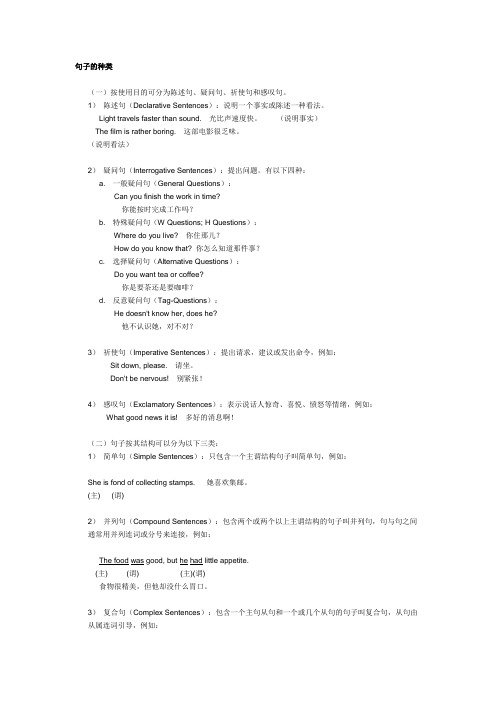
句子的种类(一)按使用目的可分为陈述句、疑问句、祈使句和感叹句。
1)陈述句(Declarative Sentences):说明一个事实或陈述一种看法。
Light travels faster than sound.光比声速度快。
(说明事实)The film is rather boring.这部电影很乏味。
(说明看法)2)疑问句(Interrogative Sentences):提出问题。
有以下四种:a.一般疑问句(General Questions):Can you finish the work in time?你能按时完成工作吗?b.特殊疑问句(W Questions; H Questions):Where do you live?你住那儿?How do you know that? 你怎么知道那件事?c.选择疑问句(Alternative Questions):Do you want tea or coffee?你是要茶还是要咖啡?d.反意疑问句(Tag-Questions):He doesn't know her, does he?他不认识她,对不对?3)祈使句(Imperative Sentences):提出请求,建议或发出命令,例如:Sit down, please.请坐。
Don't be nervous!别紧张!4)感叹句(Exclamatory Sentences):表示说话人惊奇、喜悦、愤怒等情绪,例如:What good news it is!多好的消息啊!(二)句子按其结构可以分为以下三类:1)简单句(Simple Sentences):只包含一个主谓结构句子叫简单句,例如:She is fond of collecting stamps.她喜欢集邮。
(主)(谓)2)并列句(Compound Sentences):包含两个或两个以上主谓结构的句子叫并列句,句与句之间通常用并列连词或分号来连接,例如:The food was good, but he had little appetite.(主)(谓)(主)(谓)食物很精美,但他却没什么胃口。
英语句子种类

句子一.英语句子种类与类型I、句子种类(按交际用途分)陈述句、疑问句、祈使句、感叹句、There-be存在句II、句子类型(按句子结构分)简单句、并列句、复合句、并列复合句二.句子类型详解1、陈述句说明一个事实或陈述一个看法,有肯定式和否定式,语序是主语在前,位于在后。
She arrived early.(肯定式:陈述事实)She cannot have arrived now.(否定式:陈述事实)The movie is rather boring.(说明看法)否定式:在助动词、情态动词后面+not.(注意含实义动词的句子变成否定句要根据具体情况借助助动词或者情态动词。
)注:1)半否定句I hardly know anything about it.(hardly几乎不)2)部分否定句与全否定句I don’t like both the films.I like neither Cathy nor Mary.3)否定转移I don’t think it will be very cold today.(believe, expect, suppose,imagine这些词用于否定时,都要否定转移)2、疑问句有一般疑问句、特殊疑问句、选择疑问句、反义疑问句。
1.一般疑问句用来询问一件事,答案通常是yes或no,注意语序。
含be动词的一般疑问句,其结构为:be + 主语+ 其它部分?1)Is this your English book?Yes,it is.No,it isn`t.2)Are these your English books?Yes,they are.No,they aren’t.2.含情态动词的一般疑问句,其结构为:情态动词+ 主语+ 动词原形+ 其它部分?(can must might may need等)Can you speak English?肯答:Yes,I can.否答:No,I can’t补充:情态动词,在英文中主要用来表示说话人的看法、态度等。
英语句子种类与类型
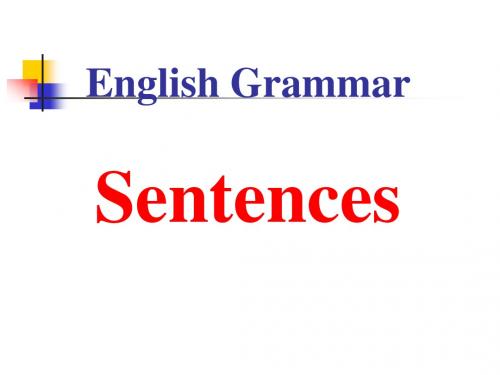
二 、 句 子 类 型
The man dressed in black seems to be a spy.
2、并列句 包含两个或更多互不依从的主谓 结构,分句由并列连词and,then,but,or,or else,so,for,while,when;both…and,either …or,neither…nor,not only…,but also,as well as等来连接。 二 、 He is a basketball fan, and his wife is a volleyball fan. 句 子 Honey is sweet, but the bee stings. 类 型 Don’t be late, for there is a meeting.
I
II、句子类型(按句子结构分)
简单句、并列句、复合句、并列复合句
1、简单句 只包含一个主谓结构,个个成分都是 单词或短语的句子。
All roads lead to Rome. He got up, dressed quickly, washed himself and went out. Is he a superman? Don’t be shy. Have a try.
4)反义疑问句 I 、 句 子 种 类
shall we? 6.Let’s go to the match at once, ______
will Leave me alone, ______ you?
haven’t they? 7.They have been learning to drive, ______
Shall I help you or can you manage? (2)以特殊疑问句为基础 Which do you prefer, red wine or white?
- 1、下载文档前请自行甄别文档内容的完整性,平台不提供额外的编辑、内容补充、找答案等附加服务。
- 2、"仅部分预览"的文档,不可在线预览部分如存在完整性等问题,可反馈申请退款(可完整预览的文档不适用该条件!)。
- 3、如文档侵犯您的权益,请联系客服反馈,我们会尽快为您处理(人工客服工作时间:9:00-18:30)。
英语中的句子种类
陈述句,疑问句,祈使句,感叹句
(划分标准:语气)
一. 陈述句
1. 定义:陈述句是用于陈述一个事实或表达说话人的看法的句子。
陈述句主要分为肯定句和否定句。
2. 陈述句的肯定句式主要有五种基本句型
(1)“主语+系动词+表语”
I am honored. 我很荣幸。
(2)“主语+不及物动词(谓语)”
The students work very hard.
学生们学习很努力。
(3)“主语+及物动词(谓语)+宾语”
I teach English. 我教英语。
(4)“主语+及物动词(谓语)+间接宾语+直接宾语”,间接宾语是人,直接宾语是物。
能接双宾语的动词多数要在间接宾语前加to或for。
①加to的动词有give, send, pass, take, bring, show, lend, sell等。
She sent me a present.=She sent a present to me.
她寄给了我一份礼物。
②加for的动词有buy, make, build, mend, cook等。
My father bought me a bike.=My father bought a bike for me. 我爸爸给我买了一辆自行车。
(5)“主语+及物动词(谓语)+宾语+宾语补足语”
The teacher asked the students to listen carefully in class. 老师要求学生上课认真听讲。
3.陈述句的否定句式
(1)be动词+not
(2)情态动词/助动词+not+动词原形
I don't get up at six o'clock this morning.
今天早上六点我没有起床。
(3)no, never, har dly, seldom, few, little, nobody, neither…nor, none 等词构成否定句。
I can hardly believe his story.
我几乎不相信他的故事。
(4)“too…to…”句型本身具有否定的含义。
She is too young to go to school.
她太小,还不能去上学。
二. 疑问句
1.一般疑问句
(1)一般疑问句主要有三种结构:
①Be+主语+其他?
②助动词+主语+动词原形+其他?
③情态动词+主语+动词原形+其他?
(2)一般疑问句的回答用yes或者no。
2.特殊疑问句
常见的疑问代词有what, which, who, whom, whose;
常见的疑问副词有when, where, why, how。
特殊疑问句的一般语序为“特殊疑问词+一般疑问句”。
[注意]如果特殊疑问词在特殊疑问句中作主语,此特殊疑问句要用陈述句语序。
3.选择疑问句
选择疑问句有两种:“一般疑问句+选项”和“特殊疑问句+选项”。
—Would you like some juice or tea?
你想要些果汁还是茶?
—Neither. 都不要。
4. 反意疑问句
反意疑问句的构成:陈述句+附加疑问句?(附加疑问句的否定式必须缩写。
) 1.陈述句部分与附加疑问句部分意思相反:前肯后否、前否后肯。
Mary is a teacher, ____isn’t she______?
He didn't tell you the story, ____did she______?
2.反意疑问句的基本对应形式如下:
(1)be动词对应be动词。
She is a policewoman, ___isn’t she_______?
(2)情态动词对应情态动词。
He can drive the car, ____can’t he______?
(3)行为动词对应助动词的相应形式。
这种助动词主要指帮助构成疑问句或否定句的do, does, did以及它们的否定形式。
He slept for 9 hours yesterday, ___didn’t he_______?
He didn't go to the park, ____did he______?
三. 感叹句
___What_____ a beautiful flower it is!
这是一朵多么漂亮的花啊!
___What___ good news it is! 多好的消息啊!
___How _____ fast Jim runs! 吉姆跑得多么快啊!
四. 祈使句
Have a good holiday!(祝你)假日愉快!
Be careful when you cross the road.
当你过马路时请当心。
Let's have a rest. 让我们休息一会儿吧。
You'd better not play football on the road. 你最好不要在马路上踢足球。
No parking! 禁止停车!。
